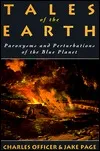Tales Of The Earth: Paroxysms And Perturbations Of The Blue Planet
By (author): "Jake Page, Charles Officer"
ISBN0195077857
ISBN139780195077858
AsinTales Of The Earth: Paroxysms And Perturbations Of The Blue Planet
Original titleTales of the Earth: Paroxysms and Perturbations of the Blue Planet
In Maryland, late in the spring of 1816, the snow fell brown, and blue, and even red. Brown snow fell in Hungary that year and in the village of Taranto in southern Italy, where any snow is rare, the red and yellow snow caused great alarm. In New England, 1816 was called the Year Without a Summer. Crops failed throughout America, the price of corn and wheat soared, and farmers (lacking feed) sold off livestock, bringing about a collapse in beef and pork prices. In Western Europe it was even worse, a major disaster, with food riots and armed groups raiding bakeries and grain markets. This turmoil followed a catastrophic volcanic eruption a year earlier on the other side of the world - the April 1816 explosion of the volcano called Tambora, on the Indonesian island of Sumbawa - a blast heard almost a thousand miles away in Sumatra. In Tales of the Earth, Charles Officer and Jake Page describe some of the great events of environmental history, from natural catastrophes such as the Tambora eruption, the Lisbon earthquake of 1755 (the greatest in recorded history), and the ice ages, to disasters such as the nuclear fallout from Chernobyl, acid rain, and the progressive depletion of the ozone layer. Officer and Page present much of their narrative through eye-witness accounts or through the commentary of prominent figures (in discussing the Lisbon earthquake, for instance, they recount the famous clash between Voltaire and Rousseau over the meaning of the disaster, and in discussing the Black Plague, they quote Boccaccio, whose Decameron was set during "the late deadly pestilence"). The authors provide fascinating discussions of meteorites and comets; of the demise of mammoths, mastodons, anddinosaurs; and of great floods that have swept the earth. But if nature can make trouble for humanity, Officer and Page show that human activity can also make trouble for nature. They examine the depletion of natural resources (we burn coal and oil at millions of times their nat
